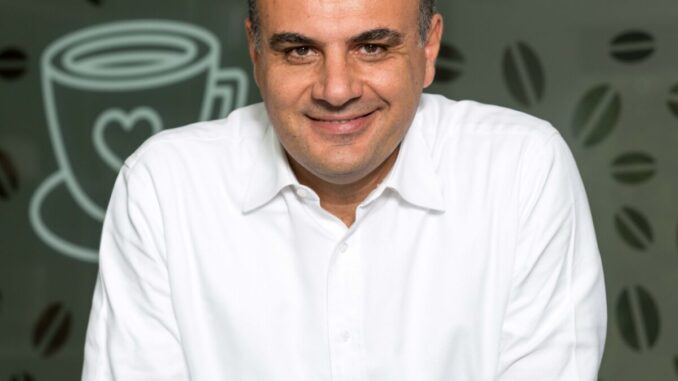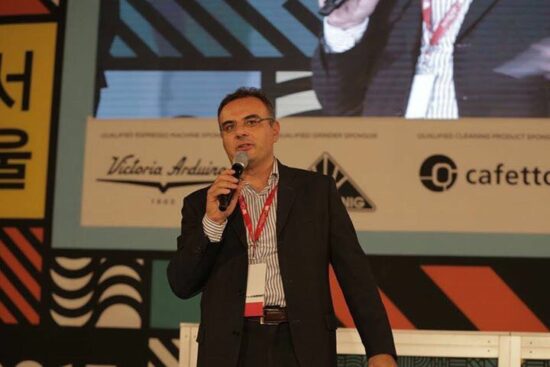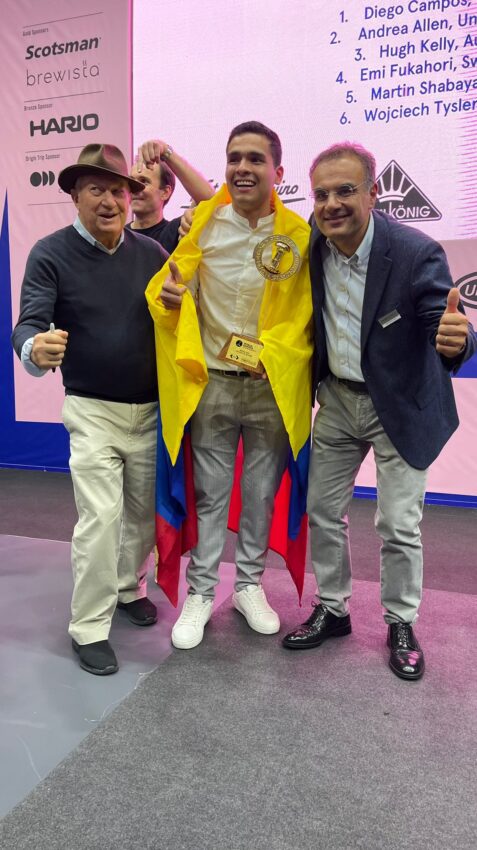
We chat with Maurizio Giuli, a longtime executive at Simonelli Group, about his lifelong commitment to the coffee world, and the well-being of the baristas who make it possible.
BY SARAH ALLEN
BARISTA MAGAZINE ONLINE
Photos courtesy of Maurizio Giuli
While Maurizio Giuli’s is a familiar face at all the biggest coffee conferences throughout the world, he’s never been one to seek the spotlight. He has every reason to, however: The quiet, kind, and brilliant Italian—who serves as executive for corporate strategy and business development for Simonelli Group in Ancona, Italy—earned a Ph.D. in coffee business studies, an area he himself has long been an expert within, having spent 23 years working in coffee, so he has seen specialty not only evolve but be born.
Maurizio remembers the debut of both the World Barista Championship (WBC) and the Specialty Coffee Association of Europe (now part of the global Specialty Coffee Association, SCA). He recalls the development of Nuova Simonelli as a company (which changed its name to Simonelli Group in 2017 and encompasses Victoria Arduino as well), and was in the driver’s seat when Nuova Simonelli’s Aurelia machine was selected in 2008 as the Official Espresso Machine by the WBC.

The WBC distinction catapulted Nuova Simonelli to specialty coffee’s center stage, which Maurizio appreciates but prefers to focus on the educational opportunities it afforded baristas internationally. Education, in fact, has always been Maurizio’s chief passion, and he has manifested this with the development and launch of the Coffee Knowledge Program, which offers seemingly endless coffee resources and scholastic opportunities to coffee professionals around the world.
On the eve of the biggest global coffee event, the SCA Expo in Boston, we caught up with Maurizio to talk about the role he has played in the coffee industry both for Nuova Simonelli and beyond, his impressions of how the WBC has helped to develop the international barista community, and his vision—which comes with a phenomenal depth of knowledge—for the future of specialty coffee.
This interview has been condensed.
Sarah Allen: What drew you to specialty-coffee equipment, and what has kept you captivated by it?
Maurizio Giuli: When I started to work in the coffee industry 23 years ago, the specialty sector we know today and the so-called “third wave” did not exist yet, except for a few isolated shops. Even espresso coffee with its espresso-based beverages was an unknown concept in many countries and to most people outside Europe. As an example, we can share that the United States imported no more than 7,000 espresso machines yearly compared to the 55,000 thousand machines imported presently. Australia and New Zealand imported a small amount of 3,500 machines, when today they import about 8,000. Even the United Kingdom imported about 3,500 espresso machines remotely, and today they import more than 20,000 professional units per year. This significant difference has always captivated me, and I’ve always wanted to see how it could expand.
The World Barista competition did not exist yet, and the SCA was just created. “Specialty coffee” and “Cafè Gourmet” were nothing more than two ways to identify a better-quality coffee. I read about this new phenomenon from some articles written in Fresh Cup, in Tea & Coffee magazine, and then in Barista Magazine.
I also met some significant coffee movement players and people, such as Alf Kramer and Mick Wheeler, during some exhibitions, and I participated at the SCAE event held in Rimini in 2004. … Since I started working in this sector, the landscape changed a lot, from a super-closed circle known to just a few people, the specialty-coffee movement became a part of our everyday lives and transformed the coffee industry worldwide. We are happy to have seen specialty develop over the years and have given our maximum contribution because we (at Simonelli) share the same evolutionary vision.

Where did you grow up, and what did you study in university?
I grew up in Mogliano, a small town in the Marche Region in Italy, where I also finished school until I went to university. I graduated in Business and Management at the University of Ancona. My thirst for wandering to new countries haunted me during those years, so I spent my last college year at the “Ecole Supérieure du Commerce extérieur” in Paris. I also worked at Disneyland Paris for six months to balance my finances. Once I graduated, I won a scholarship to get my MSc’s Degree in International Business in London. During that experience, I decided to explore the coffee industry in depth. As for many Italians, filter coffee was not satisfying, especially at the university cafeteria. To drink a decent cup of coffee, I had to travel by subway to reach one of the few coffee shops that served espresso coffee. In 1996 the London coffee scene was very different from now, and when I came back to Italy, I chose to deepen my coffee knowledge from a business perspective for my Ph.D. study.
Have you always lived in Italy? If so, how have you worked to familiarize yourself with the global coffee community, which can vary so greatly in different parts of the world?
Besides the two-year study experience in Paris and London, I extended my travels during work. I started going to many countries and contacting the local coffee communities. I had the chance to fully live the coffee industry’s critical evolution phase, which profoundly reshaped the coffee sector worldwide. If we compare the actual picture of the coffee industry with the late ’90s, they look like two different worlds. They have other players, countries, consumers, and a different scale. Everything evolved, and I believe in a very positive way. Coffee is no longer a product for a limited group of countries, and it is not just caffeine for the older generations. Coffee is not just a drink; it is an experience, social and not. It is appreciated by all genders and does not focus on only one generation. It is a hedonistic experience able to gratify oneself. You can find different coffee-based drinks in almost all countries, not focusing on the local tradition. Of course, every country has its customs and distinctive cultural features.
We will continue this interview tomorrow with Part 2.

